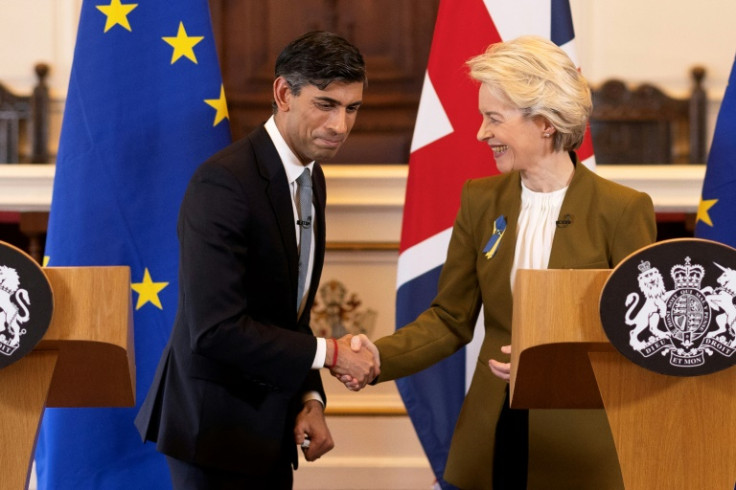Sunak Firmly Rejects Von der Leyen's Suggestions of UK Rejoining EU
Chancellor Jeremy Hunt, speaking from Downing Street, dismissed von der Leyen's remarks as unrealistic and emphasized the UK's commitment to forging an independent path post-Brexit.

In a resolute response to recent comments made by European Commission President Ursula von der Leyen, Chancellor Rishi Sunak has unequivocally rejected the notion of the United Kingdom rejoining the European Union.
The Chancellor, speaking from Downing Street, dismissed von der Leyen's remarks as unrealistic and emphasised the UK's commitment to forging an independent path post-Brexit.
On Tuesday night, Von der Leyen's comments, made during a press conference in Brussels, stirred political discourse on both sides of the English Channel.
The European Commission President expressed her belief that the UK could potentially rejoin the EU in the future, citing the unpredictability of global geopolitics and the dynamic nature of international relations.
She conceded that European leaders had made mistakes in handling Britain's departure from the bloc. She suggested that the younger generation might be able to rectify these errors.
In response to a question about the possibility of the UK rejoining the EU, she remarked, "I must say, I keep telling my children: 'You have to fix it. We goofed it up, you have to fix it.' So I think here too, the direction of travel – my personal opinion – is clear."
Contrarily, an official spokesperson for Chancellor Sunak rebuffed any notion that Brexit was in jeopardy. Speaking to reporters at Westminster, the spokesperson asserted, "It's through our Brexit freedoms that we are, right now, considering how to further strengthen our migration system."
"It is through our Brexit freedoms we are ensuring patients in the UK can get access to medicines faster, that there is improved animal welfare. That is very much what we are focused on."
"We have a prime minister that championed Brexit before it was in his career interests to do so because he believes in it passionately. We are very focused on making a success of it," they added.
Sunak highlighted the strides the UK has made since the completion of the Brexit transition period, emphasising the signing of trade agreements with nations across the globe and the country's robust economic recovery post-pandemic.
The Chancellor underscored the importance of these achievements in demonstrating the UK's ability to thrive independently.
The rejection of the idea of rejoining the EU reflects the prevailing sentiment within the current UK government, which has consistently advocated for a sovereign and global Britain.
The Chancellor's remarks align with Prime Minister Boris Johnson's vision of a post-Brexit UK that forges its own trade deals, sets its own regulations and determines its future without being bound by EU policies.
Political analysts suggest that von der Leyen's comments may be an attempt to leave the door open for future collaboration between the UK and the EU, despite the current political landscape.
However, the response from Chancellor Sunak, seen as the economic architect of the government, makes it clear that the UK is focused on its independent trajectory and is not entertaining thoughts of rejoining the EU at this time.
The topic of Brexit continues to stir divisions within the Conservative party.
Sunak and von der Leyen, however, have maintained amicable relations since collaboratively negotiating an agreement to enhance the terms for Northern Ireland, leading to the UK's reentry into the Horizon programme.
The debate over the UK's relationship with the EU continues to be a central theme in British politics, with various factions holding differing views on the matter.
While some argue that rejoining the EU would bring economic and diplomatic benefits, others, including the government, believe that the UK's current path offers greater opportunities for sovereignty and global engagement.
As the political discourse unfolds, it remains clear that Chancellor Sunak's rejection of the idea of rejoining the EU underscores the government's commitment to its current trajectory.
The UK's future relationship with the European Union will undoubtedly be a defining factor in the nation's post-Brexit identity and its role on the international stage.
© Copyright IBTimes 2025. All rights reserved.






















